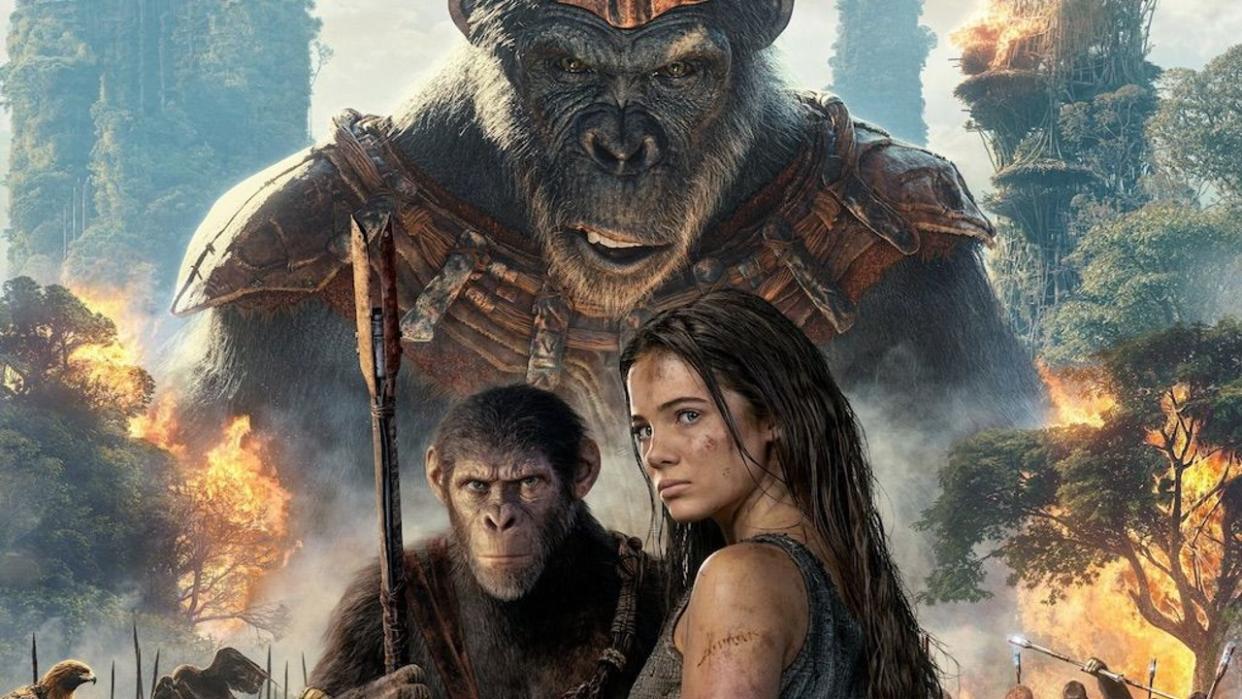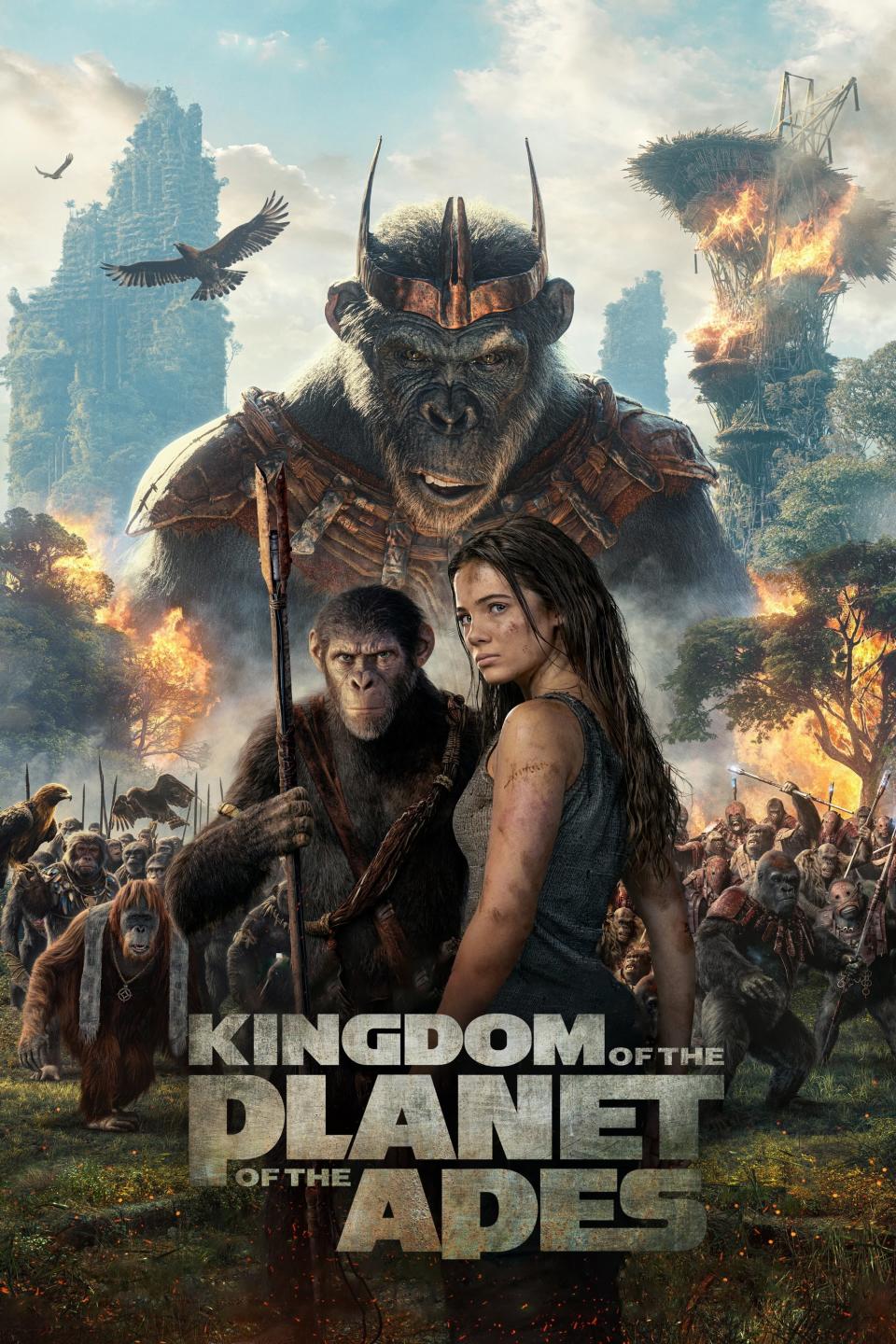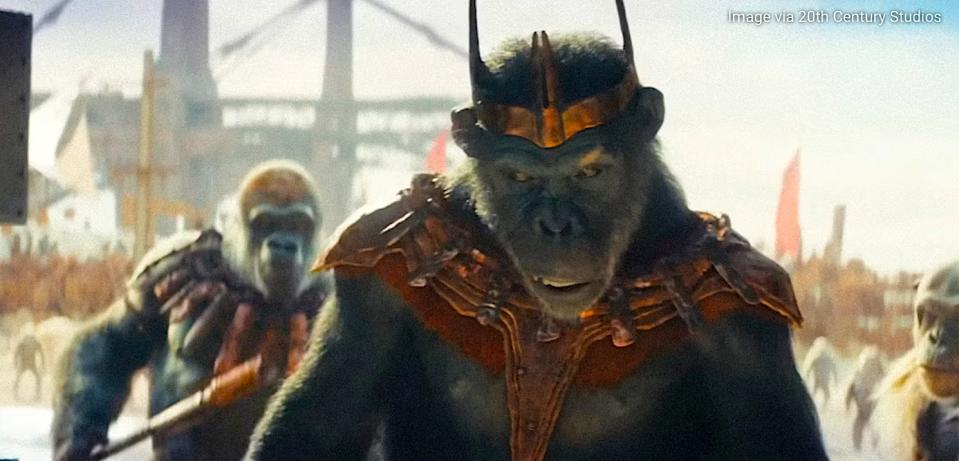'Kingdom of the Planet of the Apes' reinvigorates an aging 'Apes' franchise (review)

- Oops!Something went wrong.Please try again later.
- Oops!Something went wrong.Please try again later.
- Oops!Something went wrong.Please try again later.
One of the most underappreciated and longest-running franchises in Hollywood history is "Planet of the Apes," that imaginative science fiction property which began with the Charlton Heston-led classic from 1968 directed by Franklin J. Schaffner.
Adapted from the 1963 French novel by Pierre Boulle, the plotline centered around astronauts crash landing on a planet in the far future where intelligent simians rule the world and humans are mute feral creatures subjected to all kinds of cruelties. The twist ending of course is that this is no remote alien world, but actually a post-apocalyptic Earth as unveiled in the unforgettable finale when Heston's Taylor character discovers a half-buried Statue of Liberty on the shoreline.
Despite four '70s sequels of wildly varying quality and one forgettable 2001 remake helmed by Tim Burton, the franchise was then injected with fresh life in 2011 as a total series reboot for director Rupert Wyatt's "Rise of the Planet of the Apes." That spawned two absorbing sequels from instinctive filmmaker Matt Reeves ("The Batman"), 2014's "Dawn of the Planet of the Apes" and 2017's "War for the Planet of the Apes," which both chronicled the ascension of Caesar as the Simian Flu decimated Earth's population and apes rose to become the dominant species.
Related: Apes ponder their place in the universe in 'Kingdom of the Planet of the Apes' trailer (video)
Now, director Wes Ball ("The Maze Runner Trilogy") continues the cinematic saga with a 300-year leap into tomorrow with "Kingdom of the Planet of the Apes," which arrived this past weekend carrying the kind of fanfare and hype that it truly deserves. Imbued with all the heart and spirit of what makes the "Planet of the Apes" world so compelling by holding up a mirror to reflect our conflicted humanity and its core qualities, this 10th entry is a superb piece of smart filmmaking.

With a sensible $160 million budget, "Kingdom" had a solid opening weekend by raking in $131 million worldwide for Disney-owned 20th Century Studios. Set three centuries after the reign of the messianic Caesar when complex simian societies have thrived and humans are shadowy scavengers living in remote obscurity, a naïve chimp named Noa embarks on a quest across the skeletal remains of humanity's past to rescue his Eagle Clan from hostile ape raiders and the gorilla warlord Proximus Caesar. Accompanied by a sagacious orangutan named Raka and a mysterious human girl called Mae, Noa's journey causes him to rethink his entrenched beliefs and formulate a plan to protect his tribe amid clashing ideals.

Using the latest bells and whistles attached to motion capture technology, the brilliant cast of apes and chimps includes Owen Teague as Noa, Kevin Durand as Proximus Caesar, Peter Macon as Raka, Travis Jeffery as Anaya, Lydia Peckham as Soona, Neil Sandilands as Koro, Sara Wiseman as Dar, Eka Darville as Silva. On the human side we have Freya Allan playing Mae and William H. Macy as Trevathan.
Make no mistake, this is courageous, old-fashioned Hollywood filmmaking at its best and Ball is to be commended for confidently tackling his entertaining sequel and displaying such style and substance. The talented director deftly embraces the legacy of the franchise's past while at the same time crafting something provocative unto itself as an adventurous sci-fi road trip film with the specter of Caesar's teachings haunting its every frame and an eye firmly fixated on the heavens.
Swinging along at a moderate pace for a 145-minute runtime (with credits) that never seems boring, "Kingdom of the Planet of the Apes" is a triumph of solid storytelling, cutting-edge motion capture work by the actors, and a multi-layered score from John Paesano ("The Maze Runner Trilogy") that honors the tribal notes of Jerry Goldsmith's masterful music from the 1968 movie.
Look closer and you'll enjoy other subtle callbacks to that first "Apes" installment such as the ancient human "Mama" doll discovered at the oceanside archaeological site in that vintage flick, and the brutal human slave roundup as first experienced by Charlton Heston's time-lost astronaut with the scene's trumpeting horns and drums.

Departing in a sense from the last trilogy and forging a soft reboot complete with a perfect setup to launch into another trilogy, Ball and his sharp screenwriter Josh Friedman have thrust this engrossing film into a new dimension by presenting an open-world realm to explore, especially when venturing into the reclaimed husks of skyscrapers, crumbling sports stadiums, and rotting transportation structures. It takes a lot of gusto to tackle such an imposing production and give it a person stamp, but Ball pulls it together in a way that at once feels familiar and fresh.
Particularly absorbing is the beautiful final sequence with Noa and girlfriend Anaya peering through the decaying telescope inside what appears to be the remnants of the Griffith Observatory in Los Angeles. But precisely what marvels appear in the optics is never actually revealed, as we cut to a faded wall mural of an astronaut, leading to some cool off-planet speculations to be mused over until the next film.
It might present a slow start to introduce the characters and worldbuilding, but "Kingdom of the Planet of the Apes" is a satisfying excursion that builds to a crescendo inside an abandoned military bunker and revelations that humanity might not be as decimated as we've been led to believe. Down for the count? Not so fast!

